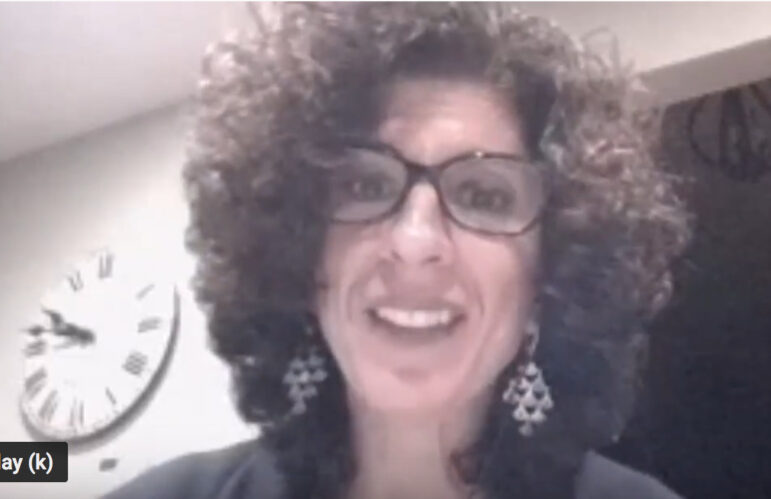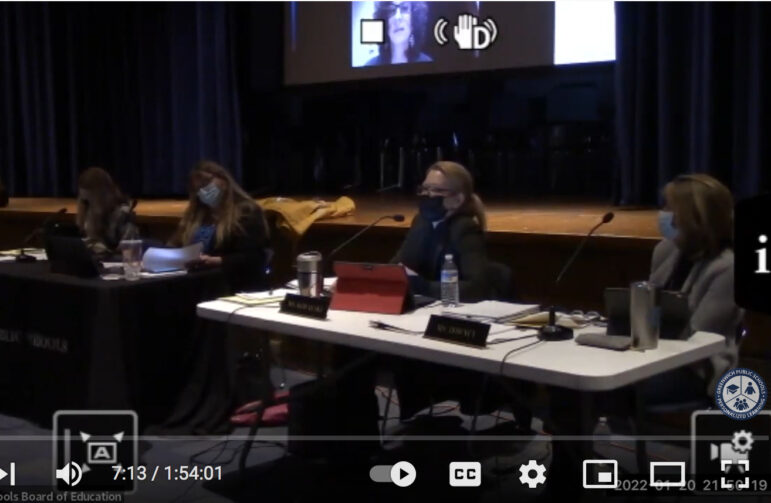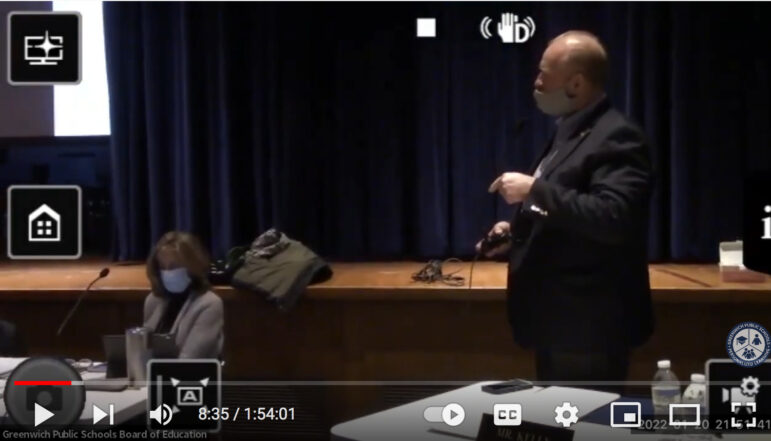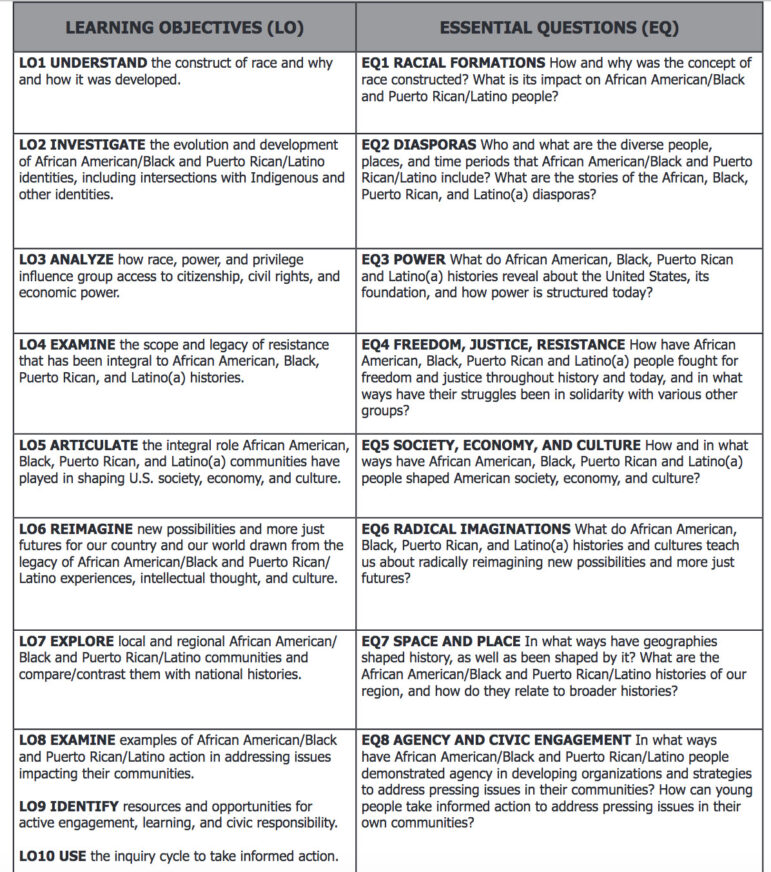Two new courses Greenwich High School courses were presented to the Board of Education on Thursday.
One is Honors Anatomy and Physiology. This was previously included in the AP Biology curriculum, but that was revised by the College Board in 2019. Now the course is offered on grade level, and this would be an additional honors level.

The second course, African American/Black and Puerto Rican/Latino Studies, is state mandated and would start in the 2022-2023 school year.
The course stems from Connecticut Public Act 19-12, “An Act Concerning the Inclusion of Black and Latino Studies in the Public School Curriculum.”
The full year elective course is intended for juniors and seniors will have an honors option. Recommended prerequisites for the course are US History and Modern World History.
Lucy Arecco, Bella House administrator and social studies program administrator at Greenwich High School, presented details on the course.
“The course provides an opportunity for students to learn about the accomplishments, challenges, intersections of African-American, Black and Puerto Rican and Latino people in the US,” she said. “By taking this course, students will strengthen their own sense of identity and deepen their understanding of historic and contemporary tensions around race and difference.”
“It also talks about the systemic racism and doesn’t even even ask the question, ‘Is there systemic racism?'”
– Karen Kowalski, Vice Chair, Greenwich Board of Education
Students will learn about the course in course selection meetings their guidance counselors which begin after February vacation. Social studies and English teachers will also promote the course in their 10th and 11th grade classes.
Arecco said she hoped at least two sections would be filled, with roughly 50 students.
The four Republicans on the board all took issue with the course.
Karen Kowalski asked deputy superintendent Ann Carabillo why the district would adopt the entire course and curriculum provided from the State Education Resource Center.
“Because we are required,” Carabillo replied.
“Why are we required?” Kowalski asked. “It seems to be very prescriptive. The state came out with a day-to-day, almost class-by-class designation of exactly what we should be teaching. My concern with this particular class is if you read it in detail it talks about, in broad brush strokes, everything we’ve said we’re not teaching here, which is Critical Race Theory.”
“We’ve heard administrators over and over say we are not teaching Critical Race Theory,” Kowalski added. “Well, that is exactly what this class teaches.”
Ms Carabillo explained the course was required by the state of Connecticut, and Greenwich Schools has to follow what the State directs the district to adopt.
“It’s the same as requiring 25 credits required for graduation,” Carabillo said. “It is not required for student to take it. It is an offering.”

“One particular thing is it talks about – it relates Columbus in 1492 to the current police brutality against Latinos. That’s making a very bold statement.”
“It also talks about systemic racism, and doesn’t even even ask the question, ‘Is there systemic racism?'” Kowalski said. “It just assumes there is. I find this class to be completely out of line with what Greenwich Public Schools should be teaching.”
“It also takes a hard line on policing in general,” she added. “In fact we have a police officer at the back of the room. I think he would take offense to it as well. I find it completely irresponsible, and not something that should be happening in Greenwich.”
Ms Carabillo said the state will welcome parent feedback on the course over the next year.
Ms Kowalski said she wanted to audit the class herself.
Board member Michael-Joseph Mercanti-Anthony noted the syllabus had been drafted by a committee of over 100 people and, in the first semester, spans the time of African kingdoms to present day, before switching in second semester to Latino Studies.
“It’s a mile wide and an inch deep,” he said. “It’s unrealistic. You can’t plan out a whole term, day-by-day.”
Mercanti-Anthony asked if there were any other courses where day-by-day lessons were “lock step mandated.”
Carabillo said she viewed the day-by-day lessons as a guide. “It’ll be a learning experience for all of us.”

“Maybe just a fun thought for us – if the state can require us to teach a class that is maybe intellectually lacking or perhaps misleading to students, maybe we should consider having a critical thinking class or something to encourage them to take if they’re taking this elective. They can’t force us not to teach something yet, at least yet,” said board member Cody Kittle.
“Critical thinking might be a helpful way to offset,” he added. “These classes are obviously overly politicized, and tend to have social agendas associated with them that aren’t academic or related to what school should be teaching. Just something to counteract a heavy hand from the state here.”
A full curriculum guide, including lesson plans and resources, provided by the State Education Resource Center (SERC) can be accessed HERE.
More on public act 19-12 and opportunity for feedback HERE.
Curriculum outline:
Semester 1: Focus on African American/Black History
Unit 1: Where We Come From: Introduction to African Origins and Contributions of Ancient African Empires to World Civilizations and the African Diaspora (500 B.C.E. to 1600)
Unit 2: How African Americans Persisted: Slavery and Freedom Stories of Resistance and Agency (1619 to 1819)
Unit 3: Black Literacy, Organizations, and Liberation (1820-1865)
Unit 4: Long, Long History for Equality(1865-1915)
Unit 5: Black Movement for Equality (1915-1965)
Unit 6: Protest, Politics, and Power (1965- Present)
Semester 2: Focus on Puerto Rican / Latino History
Unit 1: Early Beginnings: Who Are We?
Unit 2: Blood and Beauty
Unit 3: Sweat
Unit 4: Resistance and Defiance
Unit 5: Where are we now?

See also:
BOE Public Comment Focuses on “Free Speech,” Students Eating Outdoors in the Cold
P&Z Watch: GHS Safety Entrance Approved with Conditions, Including Landscape and Lighting Plans